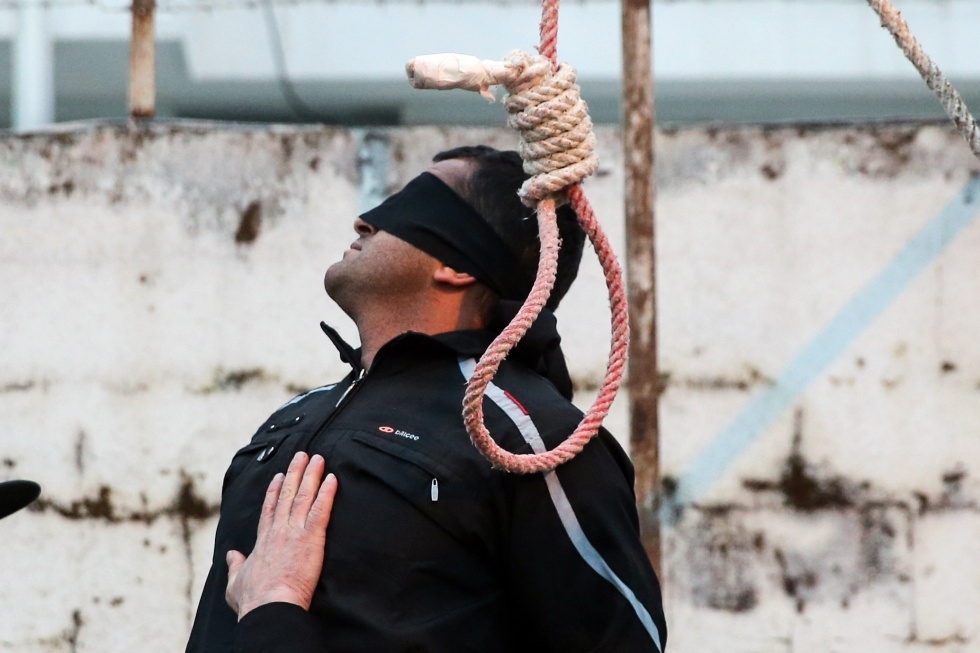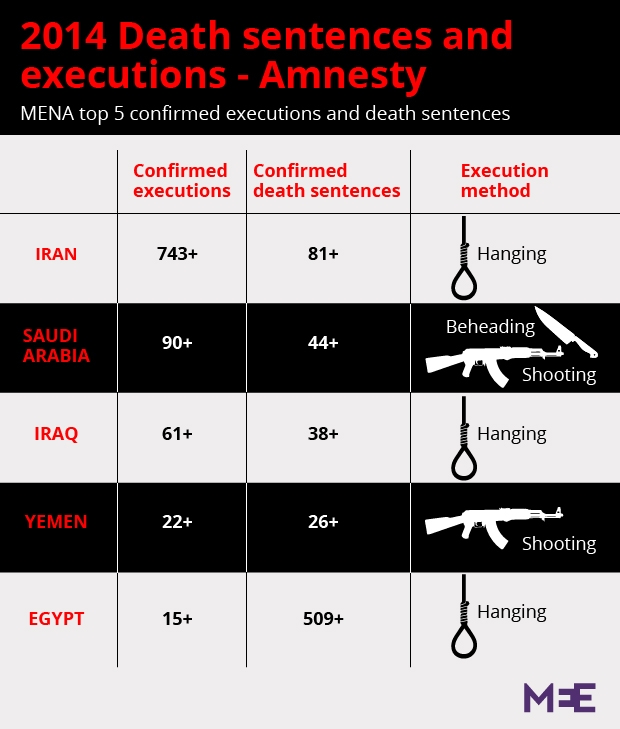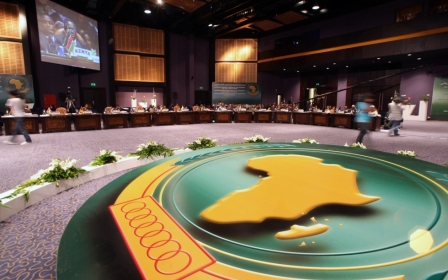Iran, Saudi Arabia, Iraq among world's top users of death penalty: Report

Iran, Saudi Arabia and Iraq feature in the top five countries around the world that executed most people in 2014, according to a report released on Tuesday by Amnesty International.
China topped the list, with an unknown number of executions thought to be in the thousands, and the United States was fifth with 35.
Official media in Iran announced 289 executions in 2014 but Amnesty said “reliable sources” put the number much higher at 743. Saudi Arabia executed at least 90 people and Iraq at least 61.
The three countries accounted for 90 percent of the total executions reported by Amnesty in the Middle East and North Africa (MENA), although state-sanctioned killings also took place in Yemen (at least 22), Egypt (at least 15), Jordan (11), the Occupied Palestinian Territories (2) and the United Arab Emirates (1).
Amnesty said it had been "particularly difficult" to source reliable information across the region, meaning that the number of reported executions may not reflect the actual number of people killed.
For instance, in the Gaza Strip Hamas authorities reportedly killed at least 21 suspected "collaboraters" with Israel during the conflict last summer, meaning a total of two executions reported by Amnesty in the Occupied Palestinian Territories is unlikely to represent the total number of executions there.
Iran carried out at least 29 public executions but a number of secret killings also took place. These include Hadi Rashedi and Hashem Sha’bani who were executed in January 2014 – their families were not informed of the deaths and the bodies were not returned to the families according to Amnesty. The two men were from the Ahwazi Arab minority, a group that has recently stepped up protests against alleged state discrimination.
At least 14 of those executed in Iran were reported to be under the age of 18 when they were convicted and Amnesty also expressed concern that juvenile offenders may have been executed in Saudi Arabia and Yemen.
Saudi Arabia remained the only country in the world to use beheading as a method of execution – prisoners were also killed by firing squad in the conservative Gulf kingdom. Hanging and shooting were the most common execution methods in MENA, although in the UAE a woman was sentenced to death by stoning for adultery while married, but this was not carried out.
In Iraq executions were carried out for crimes that included terrorism, murder and kidnapping. Amnesty said the 2014 total of 61 reported executions were down from at least 169 in 2013, although the human rights group did acknowledge the ongoing conflict across the country limited their access to reliable data last year.
The 11 men executed in Jordan were the first to be killed in eight years. Authorities said the men – all convicted of murder – were executed because of rising murder rate in the Arab state.
The London-based watchdog also reported that death sentences handed down by a total of 16 countries in the region increased by 100 percent in 2014.
The increase was largely due to the condemning of at least 509 people in Egypt to death, which accounted for 65 percent of all death sentences in the region, as President Abdel-Fattah al-Sisi pursued a brutal campaign of repression against supporters of the Muslim Brotherhood and opponents of the July 2013 popularly backed military coup.
Amnesty described the death sentences in Egypt as having come “after mass trials that were grossly unfair”.
Eight countries that sentenced prisoners to death but did not carry out any executions were: Algeria, Bahrain, Kuwait, Lebanon, Libya, Morocco/Western Sahara, Qatar and Tunisia.
Many of those sentenced to death across the region, according to the Amnesty report, were not convicted of offences that met the threshold of “most serious crimes” as noted by Article 6 of the International Covenant on Civil and Political Rights.
The UAE sentenced prisoners to death for drug-related offences, adultery and rape. In Iran people were also condemned to death for drug-related offences, but there were also cases involving “insulting the prophet of Islam”. Saudi Arabia handed down the death sentence to individuals convicted of, among other offences, drug-related offences, rape, kidnapping and torture – there were also incidents of people being convicted of “witchcraft” and “sorcery”.
Amnesty criticised executions as a tool for combatting crime, saying there was no evidence to back up this approach.
“The argument in support of use of the death penalty to combat crime ignores the fact that there is no convincing evidence that the death penalty works as a particular deterrent to crime, or that it is more effective that terms of imprisonment.”
New MEE newsletter: Jerusalem Dispatch
Sign up to get the latest insights and analysis on Israel-Palestine, alongside Turkey Unpacked and other MEE newsletters
Middle East Eye delivers independent and unrivalled coverage and analysis of the Middle East, North Africa and beyond. To learn more about republishing this content and the associated fees, please fill out this form. More about MEE can be found here.





